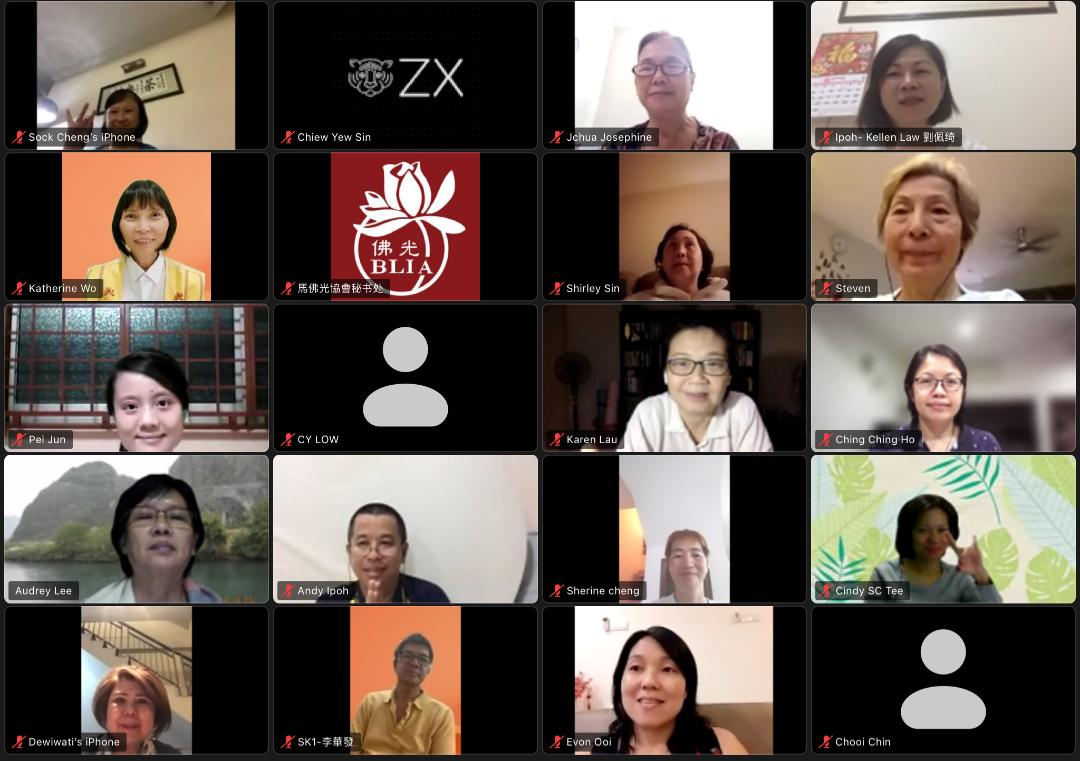Topic: Buddha-dharma: Pure and Simple — Three Acts of Goodness
A total of 33 readers joined this session facilitated by Venerable Miao Tan.
In this passage, Venerable Master Hsing Yun emphasised the importance of practicing the Three Acts of Goodness — Do Good Deeds, Speak Good Words and Think Good Thoughts, because according to Master, spiritual cultivation starts from cultivating wholesome physical, verbal and mental karma. It embodies the essence of the Buddha’s teaching and contain the profound Dharma that holds true to the original intents of the Buddha. Master also aimed to remind us that the Three Acts of Goodness is not just a slogan, but rather, it is a mission to put into action. He also transmits the message to us to cultivate good karma.
In this session, Venerable Miao Tan shared her views how we can cultivate good karma by applying the Three Acts of Goodness and practice with the Five Precepts.
1) Refrain from killing is a practice of compassion. One of the ways introduced by Venerable Miao Tan is to become a vegetarian. The wholesome effect of this practice is we will create a healthy ecosystem for everyone to live in harmony.
2) Refrain from stealing promotes righteousness. An example quoted by Venerable is, as Buddhist, we can contribute to save this Earth by not stealing lives from nature, such as cutting trees, harvesting pearls, minerals, etc…
3) No lying is to build trust by saying good words. Slandering or gossiping cause problems between people. Therefore, we must always say good or encouraging words and respect the reputation and credibility of other people.
4) No sexual misconduct is a practice of doing good deeds and in so doing, cultivating good thoughts. When one practice good conduct and behaviour, we create a harmonious society and build a trusted relationship with people around us.
5) No intoxication promotes the practice of speaking good words. Intoxicants are stimulants that poisons the body and mind. By refraining from intoxicants is to respect the health and intelligence of oneself and others, thereby enhances wisdom and forming good affinities with people.
In a nutshell, by upholding the Five Precepts, we are embracing all the Three Acts of Goodness; doing good deeds is to cultivate wholesome actions to purify one’s karma; speaking good words is to cultivate wholesome speech to purify one’s verbal karma; and thinking good thoughts is to cultivate wholesome thoughts to purify one’s mental deeds. One reader highlighted a good point that talking with the right intonation also promotes the act of speaking good words.
Master’s compassion is always with us as he remembered to offer advise to those who had unfortunately conducted unwholesome actions. The two ways that Master taught are to repent and make vows. By making sincere repentance, one can lessen the severity of unwholesome karma and by making vows to practice the Three Good Acts diligently, it will give rise to wholesome and virtuous thoughts. These three actions may seem simple but it contains the profound teachings that Master advocated in Humanistic Buddhism and, as reminded by Venerable Miao Tan, we must cultivate these virtues and pass down to our next generation so that society will become more harmonious and the world a better place. With that, the class ended with the Transference of Merit. May all be well and happy!

Three Acts of Goodness
Share on facebook
Share on whatsapp
- 25/11/2021
- 知涵法師
